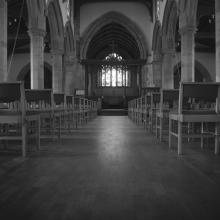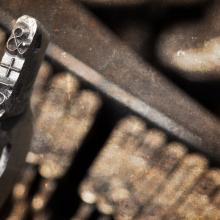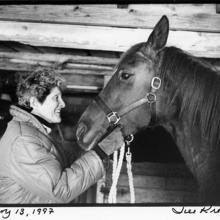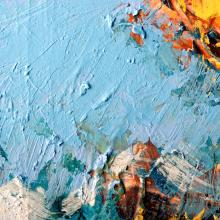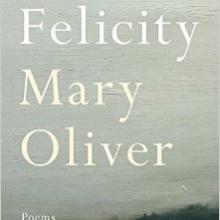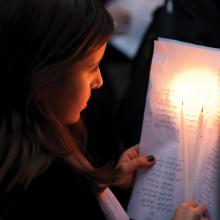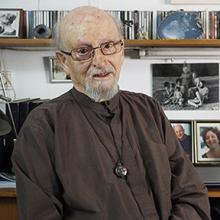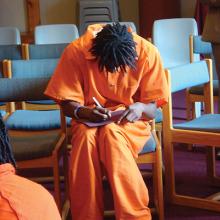Poetry
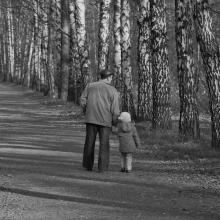
Pavel L Photo and Video / Shutterstock
WHEN I WAS BORN—the first child of Dan Berrigan’s brother Phil and Elizabeth McAlister—my uncle sent my parents a sheaf of poetry. On it, he wrote a note: “Dears, I send these with trepidation. They are uneven; but then so is life, no? Love, Daniel.”
My parents put the dozen or so poems in a book and gave them to me on my eighth birthday with their own note: “We don’t expect you to understand all of them yet but you can now begin to read and grow with them.” Yet. Right. I am now 34 years older than I was when I first opened the little red bound book of handwritten poems, and I don’t understand them any better.
But now that my dearest Unka has passed from this world, I hold on tight to this collection and try really hard to understand. It is going to be tough. The poems are full of words the dictionary either fails to define or further confuses—supramundane, Blake’s child, Dante’s paradise (what are boys from middle school doing in Unka’s poetry?), “the bodhisattva is neither stuporous nor sleek / he is crucified.”
Fragments of these poems cycle through my head all the time, a sort of back rhythm to daily life, especially when that daily life was graced with Unka.
Uncle Dan and I would walk—down New York City’s Broadway and through Riverside Park. He breathed in such love for the natural world, even amid the Upper West Side’s hustles and bumps. He saw everything, and found the beauty that was there. The only people that made him mad were delivery men riding bikes on the sidewalks—he had been knocked down once by them and he worried about the elderly—and people who lost themselves in their phones.

Panya Anakotmankong / Shutterstock
We are the long grass and anxious wind,
the generations, speaking softly, between
the lines of history.
IN THE POEMS OF PARNESHIA JONES, 35, the lines of black history that angled north from the Deep South after the First World War empty into the bruised and tender histories of family and community.
The lines above are from “Legacy,” one of the poems from her first collection, Vessel (Milkweed Editions), dedicated to Evanston, Ill., Jones’ hometown, and the home of Shorefront, the organization that documents black lives on the North Shore of Chicago.
“I had a lot of storytellers around me growing up,” Jones tells Sojourners. “My grandmother was a storyteller, my grandpop was a storyteller. I was always the youngest of the group, so I was trained to listen. When you listen to everyone else, you carve out a space to listen to yourself. Young poets should listen more to their families, to the voices they heard growing up.”
The poet says she was raised in her grandfather’s juke joint. He migrated north from Mississippi. Her first dog came from Gypsies who hung out outside his clubs.
Jones’ voice, even when banked by the din of a mid-Manhattan restaurant, is soft, leisurely. Telling her story, she will not be hurried. Her story begins with a portentous name, the spawn of chance.
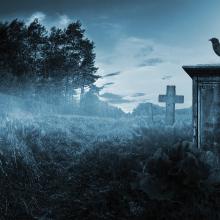
Jaroslaw Grudzinski / Shutterstock
ABOUT 20 YEARS AGO, just after she and her husband had bought a house in the countryside outside of Louisville, Ky., Kathleen Driskell returned home from the grocery to find her driveway filled with cars. With one arm grasping bags of food and the other holding on to her young son, she looked around to see what was happening. Mournful figures in dark coats were moving back and forth in the lot next door to her house. And then her eyes rested on something that made her jaw drop: a hearse.
On one hand, Driskell shouldn’t have been surprised. The house she and her husband purchased was actually an old country church dating from the 1850s, which they had begun converting into a home, transforming the sanctuary into an open living and dining room and using the honey-colored pews to build a staircase. Like most rural churches from the 19th century, it was right beside a graveyard. But the old preacher who sold them the building had assured them it was no longer in use, that there would be no more burials. “I asked him flat out,” she recalls with a smile. “And he said that it was full up and it’s been full up.”
Over the years, there have been eight or nine more burials in the graveyard next door. But after recovering from her initial shock at happening upon that first scene, Driskell realized that she didn’t mind. “I just don’t think about graveyards that way,” she says. “I never really have thought about them as being spooky places.” Instead, she has found herself inspired by the cemetery and its dead—so intrigued, in fact, that she has written a poetry collection about her experience with her “neighbors,” as she calls them, documenting her literal and imaginative walks among the tombstones.
I HAD GEARED myself up for a sort of Job-God exchange between Mary Oliver and some wild roses in the aptly named “Roses,” from her latest collection of poems, Felicity.
This is the scene: The narrator, full of poetic angst and existential fatalism, approaches some huddled roses and wonders in their direction: “What happens when the curtain goes / down and nothing stops it, not kissing, / not going to the mall, not the Super Bowl.”
I was ready for the roses to respond in a whirlwind full of rhetorical questions about the wonder and origin of creation. Instead they deflect the inquiry: “‘But as you can see, we are / just now entirely busy being roses.’”
And I laughed. In the past, Oliver’s poetry has caused me to cry over a dog (see “The First Time Percy Came Back”) and pray accidentally (see “The Summer Day”), but never before had her poems made me laugh.
In her 2014 collection Blue Horses, the flowers are “fragile blue.” They are “wrinkled and fading in the grass” until the next morning when somehow they crawl back up to the shrubs, bloom a bit, decide they want—just like all of us—“a little more of / life.” Now, in her latest collection of poetry, Oliver’s flowers are red, and they want as much life as they can get. They are carefree roses with a love of causal banter and a kind distaste for troubling existential questions.
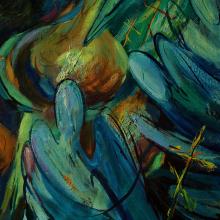
Mikhail Zihranichny / Shutterstock
SHORTLY BEFORE Irish poet Seamus Heaney died in 2013, he texted these last words to his wife, Marie: Noli timere. Be not afraid.
I’m not sure if Heaney, who was described by Robert Lowell as “the most important Irish poet since Yeats,” knew this was his last text and final words, but I suspect he did.
It’s a sad commentary that when the Twitterverse got hold of Heaney’s message, no one could figure out what it meant or where it was from. Many did not recognize the angels’ message to Zechariah (Luke 1:13) or Mary (Luke 1:30) or the shepherds (Luke 2:10) or Joseph in a dream (Matthew 1:20): Be not afraid.
Heaney understood words as “bearers of history and mystery.” As a distinguished translator of poetry from Greek, Latin, Italian, Irish, Anglo-Saxon, and Middle Scots, he had plenty of languages to choose from. But he chose St. Jerome’s fourth century vulgate version of the Bible. He chose the language of the angels.
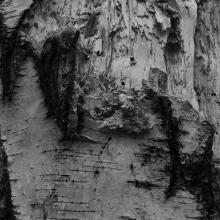
Maniola / Shutterstock
what do you call
a skeleton
unburied, performing
a slow dance
in the wind,
limbs akimbo?
The Forgiveness
By Steven
I forgive my dad for walking out on his only son
I forgive the people who think they get over
When they assume that I’m dumb
I forgive life for dealing me this hand
I forgive my inner boy for not becoming a man
I forgive the man who bumped me
Because he couldn’t see
I forgive ...
But I can’t forgive everything
Because I’ve yet to forgive me ...
Steven is an active member of the Free Minds Book Club.
TUVIA RUEBNER HAS earned the lament he wrote for King David, Israel’s better-known sorrow bearer. The poet came into the world 91 years ago in Pressburg-Bratislava, Slovakia, under Nazism’s shadow. It is a shadow he managed to separate himself from physically, but which sticks to him philosophically and is at the core of his poetry. The parched sound of random loss is the root sound in many of his poems. The spawn of an unimaginable yesterday, Tuvia Ruebner is more than anything a poet of today.
His parents, his grandparents, and his little sister Litzi all perished at Auschwitz in 1942, a year after he immigrated to British Mandate Palestine. Forty years after their deaths, Ruebner’s first son, Moran, was sent to fight in Israel’s first Lebanese war. Moran left for South America the following year, estranged from his country and its wars, and after a few letters, was never heard from again.
In Ruebner’s poem “[My father was murdered],” one by one he enumerates his losses:
Lay me down, oh lay me down bankside—
scratched by the blue wildrye, I hear the freshet-rush
of the river drunk on winter’s waters, what lie
it makes of a hushed name.
CRIMINAL JUSTICE REFORM in the United States is gaining momentum with each graphic video showing fatal police abuse. In the aftermath of the many deaths of unarmed black men and women and the city-wide protests that erupted in Ferguson, Baltimore, and Cleveland, it is not surprising that presidential hopefuls are making bold public statements about the need to change a system that is profoundly unjust, overly punitive, and excessively costly to run.
At the other end of the spectrum, away from TV cameras and political wrangling, activists such as Tara Libert and Kelli Taylor, co-founders of the Free Minds Book Club and Writing Workshop, are dealing with decades of draconian anti-crime policies that have resulted in mass incarceration rates marked by racial disparities that have had a devastating impact on families and communities.
The numbers speak for themselves. Although the United States makes up less than 5 percent of the world’s population, it has nearly 25 percent of its prison population. According to The Sentencing Project, a research and advocacy organization working to reform the U.S. criminal justice system, more than 2.2 million Americans are now locked up in prisons and jails across the country—a 500-percent increase over the past 30 years. Furthermore, those who are incarcerated come largely from the most disadvantaged segments of the population.
In recognition of National Poetry Month’s “Poetry in Our Pocket Day,” and in celebration of Sojourners’ historical love of poetry, our staff selected some favorite poems.
While statistics, tweets, marches, and articles can bolster and enliven movements, art brings in the endurance. Art makes injustice a song that gets stuck in your head. Art makes murals out of obituaries, and hope out of statistics. Below, check out some of the art surrounding the Black Lives Matter movement:
1. Epitaph as protest. In “All Eyes Are Upon Us” (Sojourners April 2015) Gene Grabiner references 14 fallen people of color—men, women, and children, from 1973 to 2014—all casualties of “this war against the people.”
2. Nightmares. In her spoken word poem “black. anathema.”Jessica Edwards mourns the feared death of her unborn black child: “My soul mourning you prematurely, / clutching my empty womb bitterly.”



